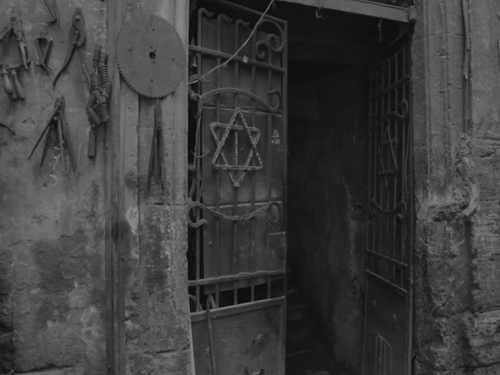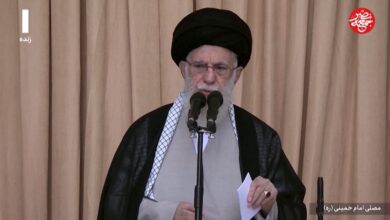
“I’m not a fan of Om Kalthoum, to be honest, and yet I am still here. And many of the others who simply loved her aren’t.”
It’s like he knows he is saying something a little naughty, but he’ll say it anyway. He doesn’t need to prove he is Egyptian. Albert Aryeh is one of the hundred or so Jews left in Egypt, and he knows he is Egyptian. The rest of the Jews gone. Their memories, as they recount them in Amir Ramses’ “The Jews of Egypt,” recall a time when their identity and allegiance were unquestioned.
They were Egyptian, and that’s all there was to it. And they were Egyptian in different ways, according to who they were. Archivist Essam Fawzi describes how the Jewish capitalists behaved like any Egyptian capitalists, and did not invest their profits abroad. Robert Grinsman recounts how he “became a communist as an Egyptian seeking change.” We learn about Yousef Darwish and Ahmed Sadek Sad, who converted to Islam in order to work more effectively, and that work was as lawyers defending workers, helping found workers syndicates and schools for the poor.
The film is a history lesson. We learn that Ciccurel, owner of large department stores, was a close associate of Talaat Harb and involved in the establishment of Egypt’s first national bank, Bank Misr. There are mentions of important Jewish figures in the country’s history, their major achievements — Laila Mourad in music, Yacoub Sanoua in theater and Togo Mezrahi in cinema. We learn that communist Henri Curiel somehow got the plan of the 1956 Tripartite Aggression and showed it to Gamal Abdel Nasser, who then declared it a fake.
Pivotal moments such as the Lavon Affair are described, and so too the moments that don’t make it into the history books, such as following the Camp David Accords, when Egyptian Jew Shehata Haroun went to the synagogue in which Menachem Begin was praying to protest his presence and the treaty.
It is a history lesson told by historians such as Mohamed Abul Ghar, by parts of Fawzi’s extensive archive, and by the Jews of Egypt and their children. A film like “Jews of Egypt” that is both rich in historical detail and in feeling is a rare one.
The film is a history lesson, not simply for these fascinating and important details, that have slipped out of popular memory. It is a history lesson in its stories. The stories they tell are of an Egypt that is almost unrecognizable.
Even if we suppose that these depictions of smooth religious harmony are laced with nostalgia, we cannot escape the fact that Egypt has lost something. Not only has it lost a part of its history, but these are stories of an Egypt far less closed in on itself than it is today, far more open, respectful and integrated.
It is a tale of history that is a decline. A fraying of social fabric, as mistrust enters into the interactions between neighbors. From a way of living where to be Jewish was inconsequential to social relations, to the way that being Jewish became an accusation.
Ruth Browning interviewed her grandmother, Julie Gresh, before the onset of Alzheimer’s. She speaks about her now in the film, she says, to ensure her grandmother’s place in the history of Egypt’s Jews. In one sense, this is indeed a history of Egypt’s Jews. It is also a chapter of Egypt’s history, a forgotten one, just as it is a forgotten part of Jewish history generally.
The story of Jews in the Middle East does not fold smoothly into a Jewish narrative of oppression, and many Egyptian Jews can trace their families’ arrival in Egypt to an escape from persecution, whether from pogroms or the Spanish Inquisition. The history of the Jews in Europe has been told such that it becomes the history of all Jews, and it is a deeply politicized narrative, its folds influenced by Zionism, such that the history of the Jews without a homeland is simply one of persecution, and that Israel offers a solution to that perennial condition.
The Jews of Egypt tell a different story. So different was this story that, even for those who did not oppose Israel for political reasons, it simply did not resonate or speak to them. As a French journalist, the daughter of an Egyptian Jew, says: “It did not occur to the family to go to Israel. That was a place for oppressed Jews, so it wasn’t for us.”
Or, as Browning says of her grandmother: “It’s not that she was against segregation, it just wasn’t who she was. Identity badges gave her an allergy. It would give her claustrophobia to be with the same kind of people. And she couldn’t understand why people would go to a country to put yellow stars on themselves.”
“Laila Mourad,” a man says near the start of the film, “she was great.” But on hearing that she was Jewish, he takes his praise back. There is only one comment of this sort in the film; it is not an exploration of contemporary Egyptian perceptions of Jews. Rather, this comment acts as a pointer to contemporary reality, and in a sense, because it is so near the start, the rest of the film is a kind of answer or a rejoinder to it.
One of the interviewees speaks Egyptian Arabic that could not be more Egyptian. A couple speak Arabic that is fluent but somehow awkward and accented. Some of the interviewees speak French, particularly those who left Egypt young to France. Another speaks a French that she describes as “not the French of the French, no one in France speaks like this.”
Many of those interviewed in the film now live in France, and indeed, even before they left Egypt, were very comfortable in French. It is clear from the stories they recount that they were from the middle and upper classes. So if the film tells the story of a forgotten era, as it suggests at the start, it is an incomplete act of remembering.
We still need to hear the stories of those Jews who did not speak French, who did not listen to ballets in between Om Kalthoum epics — whose voices may not be so easily found, but who remain essential to a telling of Jewish and Egyptian history.
The stories become darker. There’s the story of the officer who arrives at night, giving an entire family a number of days within which to leave their country. And these are stories also of resilience — the man who says to the officer, “I am more Egyptian than you,” the one who challenges the officer at his door not to “challenge the patriotism standing before him,” or the one who answers the officer’s suggestion that he leave to Israel with, “No, why don’t you go to Israel.”
While no one in the film talks about being expelled from their country, they were compelled, and even coerced, into leaving. And on doing so, they had to sign a paper that stripped them of their Egyptian identity and obliged them never to return.
Grinsman, who, after being imprisoned for three years for refusing to leave, was later forced to sign the document, and put on a ship. He was expelled, he says, not really for being Jewish, but for his socialist activism. Forced to sign that document, one respondent comments wryly that it is easier for Israelis to get into Egypt than it is for Egyptian Jews.
The film offers a tale characterized by warm memories, but also a tale of how friendships, work relationships and neighborly interminglings can become poisoned by the machinations of a regime and its propaganda machine. It is a tale of how it is easier to poison than it is to get the poison out.
But when the poison had spread to even the leftists who chose to cut ties with the group in France, according to Julie, one member of the group, “We continued to support Egypt.”
“Our support was constant, constant. We were Egypt’s children,” she says.
Jews of Egypt was shown as part of the 5th Panorama of the European Film.




